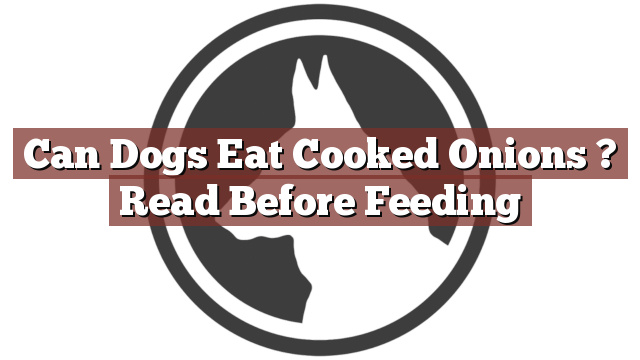Understanding Your Dog’s Dietary Needs
As pet owners, it is essential to have a good understanding of our dog’s dietary needs to ensure their overall well-being and health. While dogs are primarily meat-eaters, they can also benefit from a balanced diet that includes certain fruits, vegetables, and grains. However, not all human foods are safe for dogs to consume, and it is crucial to be aware of potential risks associated with certain ingredients.
Can Dogs Eat Cooked Onions? Read Before Feeding
Can dogs eat cooked onions? This is a question that many pet owners often wonder about. The answer is a resounding no. Onions, whether raw or cooked, can be toxic to dogs. They contain a substance called N-propyl disulfide, which can damage a dog’s red blood cells and cause a condition known as hemolytic anemia. This condition can be life-threatening for our furry friends.
It is important to note that the toxicity of onions applies to all forms, including powdered, dehydrated, and even in small amounts. So, even if you think a small piece of cooked onion won’t harm your dog, it is best to err on the side of caution and avoid feeding them onions altogether.
Pros and Cons of Feeding Cooked Onions to Dogs
There are no pros to feeding cooked onions to dogs. The cons, on the other hand, are significant. As mentioned earlier, onions can cause hemolytic anemia in dogs, which can lead to symptoms such as weakness, pale gums, lethargy, and even collapse. In severe cases, it can be fatal, especially if the condition goes unnoticed or untreated.
Additionally, some dogs may be more sensitive to onions than others. Even small amounts can cause gastrointestinal upset, including vomiting and diarrhea. Therefore, it is crucial to keep all onion-containing foods away from your four-legged companion.
Conclusion: Weighing the Risks and Benefits of Onion Consumption for Dogs
In conclusion, it is crucial to be aware of what foods are safe for our dogs to consume. Onions, whether cooked or raw, should never be given to dogs, as they can be highly toxic and even life-threatening. If you suspect that your dog has ingested onions or is exhibiting any symptoms related to onion toxicity, such as weakness or pale gums, it is essential to seek veterinary care immediately.
To ensure your dog’s health and well-being, always stick to a balanced diet recommended by your veterinarian and avoid feeding them any human food without proper knowledge of its safety. Remember, what might be healthy for us can be harmful to our furry friends. Stay informed, and keep your dog safe and healthy.
Thank you for taking the time to read through our exploration of [page_title]. As every dog lover knows, our furry friends have unique dietary needs and responses, often varying from one canine to another. This is why it's paramount to approach any changes in their diet with caution and knowledge.
Before introducing any new treats or making alterations to your dog's diet based on our insights, it's crucial to consult with a veterinarian about [page_title]. Their expertise ensures that the choices you make are well-suited to your particular pet's health and well-being.
Even seemingly harmless foods can sometimes lead to allergic reactions or digestive issues, which is why monitoring your dog after introducing any new food item is essential.
The content provided here on [page_title] is crafted with care, thorough research, and a genuine love for dogs. Nevertheless, it serves as a general guideline and should not be considered a substitute for professional veterinary advice.
Always prioritize the expert insights of your veterinarian, and remember that the health and happiness of your furry companion come first.
May your journey with your pet continue to be filled with joy, love, and safe culinary adventures. Happy reading, and even happier snacking for your canine friend!

